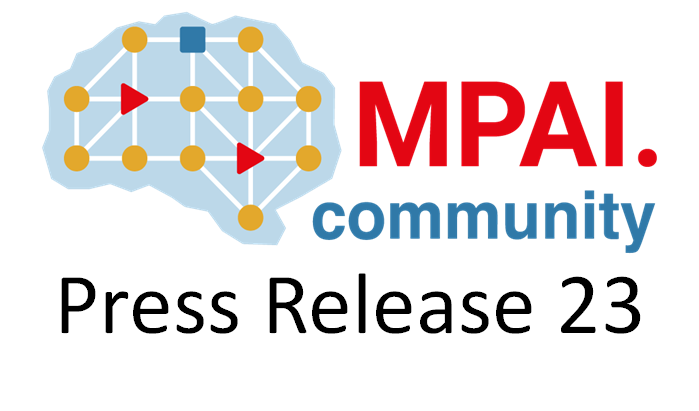Geneva, Switzerland – 23 August 2022. Today the international, non-profit, unaffiliated Moving Picture, Audio and Data Coding by Artificial Intelligence (MPAI) standards developing organisation has concluded its 23rd General Assembly (MPAI-23). Among the outcomes are three documents produced to facilitate the task of drafting a response to the currently open Calls for Technologies and one document that will facilitate the identification and positioning of the technologies defined in the Multimodal Conversation Use Cases and Functional Requirements V2. MPAI-23 has also decided to extend the deadline for submitting responses to the Calls until the 24th of October. The link to all documents relevant to the Calls can be found on the MPAI website.
MPAI-23 has also been informed that a group of individuals active in MPAI has decided to establish the MPAI Store, the entity envisaged by the Governance of the MPAI Ecosystem to have the task to assign identifiers to implementers of MPAI standards, receive implementations of MPAI standards, verify their security, test their conformance to an MPAI standard or to one of its use cases, make available for download implementations labelled with their interoperability level and publish reviews of implementation user experiences. The MPAI blog provides a description of the MPAI Store mission in the context of the Governance of the MPAI Ecosystem.
MPAI develops data coding standards for applications that have AI as the core enabling technology. Any legal entity supporting the MPAI mission may join MPAI, if able to contribute to the development of standards for the efficient use of data.
So far, MPAI has developed 5 standards (not italic in the list below), is currently engaged in extending 2 approved standards (underlined) and is developing another 10 standards (italic).
| Name of standard | Acronym | Brief description |
| AI Framework | MPAI-AIF | Specifies an infrastructure enabling the execution of implementations and access to the MPAI Store. |
| Context-based Audio Enhancement | MPAI-CAE | Improves the user experience of audio-related applications in a variety of contexts. |
| Compression and Understanding of Industrial Data | MPAI-CUI | Predicts the company’s performance from governance, financial, and risk data. |
| Governance of the MPAI Ecosystem | MPAI-GME | Establishes the rules governing the submission of and access to interoperable implementations. |
| Multimodal Conversation | MPAI-MMC | Enables human-machine conversation emulating human-human conversation. |
| Avatar Representation and Animation | MPAI-ARA | Specifies descriptors of avatars impersonating real humans. |
| Connected Autonomous Vehicles | MPAI-CAV | Specifies components for Environment Sensing, Autonomous Motion, and Motion Actuation. |
| End-to-End Video Coding | MPAI-EEV | Explores the promising area of AI-based “end-to-end” video coding for longer-term applications. |
| AI-Enhanced Video Coding | MPAI-EVC | Improves existing video coding with AI tools for short-to-medium term applications. |
| Integrative Genomic/Sensor Analysis | MPAI-GSA | Compresses high-throughput experiments’ data combining genomic/proteomic and other data. |
| Mixed-reality Collaborative Spaces | MPAI-MCS | Supports collaboration of humans represented by avatars in virtual-reality spaces. |
| Neural Network Watermarking | MPAI-NNW | Measures the impact of adding ownership and licensing information to models and inferences. |
| Visual Object and Scene Description | MPAI-OSD | Describes objects and their attributes in a scene. |
| Server-based Predictive Multiplayer Gaming | MPAI-SPG | Trains a network to compensate data losses and detects false data in online multiplayer gaming. |
| XR Venues | MPAI-XRV | XR-enabled and AI-enhanced use cases where venues may be both real and virtual. |
Please visit the MPAI website, contact the MPAI secretariat for specific information, subscribe to the MPAI Newsletter and follow MPAI on social media: LinkedIn, Twitter, Facebook, Instagram, and YouTube.
Most importantly: please join MPAI, share the fun, build the future.


